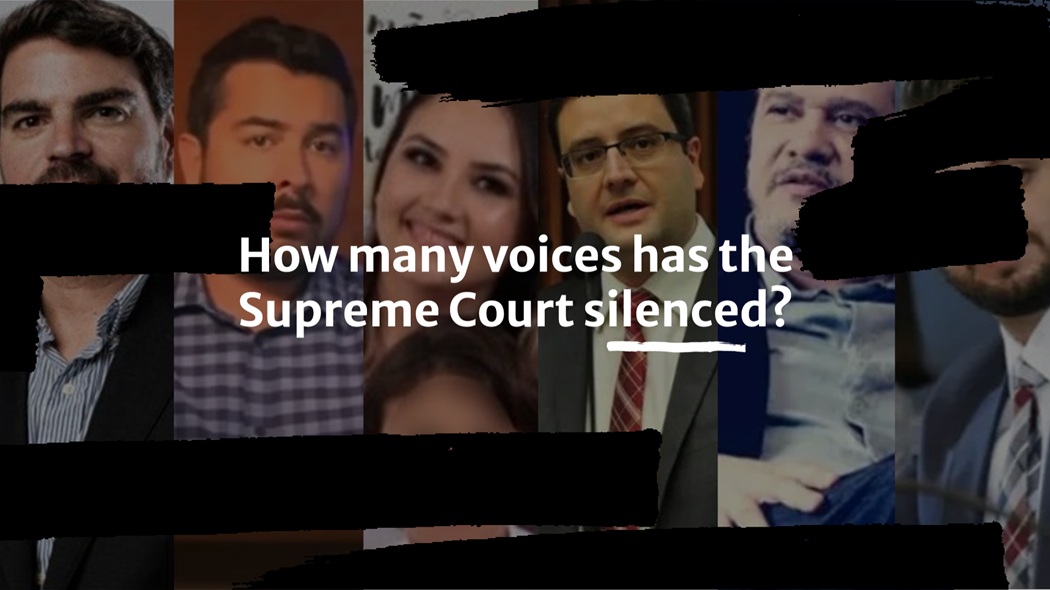By Raquel Derevecki
Copyright gazetadopovo

(This is an English version of the text originally published by Gazeta do Povo on Sunday, September 14th, 2025 [https://www.gazetadopovo.com.br/vida-e-cidadania/vozes-caladas-6-casos-censurados-pelo-stf/])
Total blocking of journalistic profiles on social media, the removal of political channels on YouTube, and bans preventing those involved in the January 8 riots from giving interviews about what they experienced — these are measures by Brazil’s Supreme Federal Court (STF) that raise serious questions about freedom of expression in the country.
“Any measure that prohibits opinions amounts to prior censorship, something incompatible with a regime of liberties,” said attorney Ricardo Scheiffer, who defends former Bolsonaro aide Filipe Martins. “What we are witnessing today is judicial censorship without precedent in Brazilian history,” added lawyer Hélio Junior, who represents hairdresser Débora Rodrigues, popularly known as “Débora do Batom,” one of the participants in the January 8 events.
Legal experts recall that Brazil’s Federal Constitution guarantees freedom of expression and prohibits censorship of political, ideological, or artistic nature. This right has even been upheld for inmates, such as drug trafficker Fernandinho Beira-Mar and former President Lula, who was allowed to speak publicly while imprisoned at the Federal Police headquarters in Curitiba in 2018.
But experts argue that current judicial rulings have disregarded these constitutional protections by preventing citizens from communicating, expressing opinions, and being heard. “It’s a direct attack on pluralism, the foundation of any democracy,” warns Hélio Junior.
According to Scheiffer, the situation highlights a worrying climate of censorship in Brazil, one that “undermines legality, freedom of expression, and the principle of proportionality.” He stresses that urgent attention is needed, since “punishing speech and silencing dissent is the classic path to authoritarianism.”
Gazeta do Povo has compiled a list of people who, in recent years, have been silenced by the STF. Here are some of the most emblematic cases:
1. Rodrigo Constantino, political commentator and writer
Political commentator Rodrigo Constantino had all his social media accounts blocked by order of the STF in January 2023. He lost access to his profiles on Instagram, TikTok, Twitter (now X), Gettr, and YouTube — and even his Patreon account, a U.S.-based platform not operating in Brazil, was targeted.
The order was linked to the ongoing “fake news inquiry” (No. 4,781), which remains under seal. Constantino says he learned of the ban through a Federal Police notice. Justice Alexandre de Moraes also imposed a daily fine of 100,000 reais on platforms if they failed to comply.
Political commentator Rodrigo Constantino had all social media blocked in
January 2023 by STF order. (Photo: Alexandre Mazzo / Gazeta do Povo Archive)
Citing public posts from his accounts, including a quote from U.S. author Tom Clancy about “freedom owed to men in uniform with guns,” Moraes ordered the complete suspension of Constantino’s online presence. The journalist only regained access to his accounts last month, after the United States sanctioned Moraes under the Magnitsky Act.
“I was punished preventively for two and a half years, without charges,” Constantino told Gazeta do Povo, adding that his reinstatement came with the condition of avoiding so-called “hate speech” — a term he says is undefined under Brazilian law.
2. Débora Rodrigues dos Santos, hairdresser known as “Débora do Batom”
Hairdresser Débora Rodrigues was sentenced to 14 years in prison for writing “Perdeu, Mané” (“You lost, sucker”) in lipstick on the statue of Justice outside the Supreme Court building on January 8, 2023. The phrase had previously been used by STF President Luis Roberto Barroso when confronted by a Brazilian citizen in New York about his judicial decisions. After spending more than two years behind bars, she is now under house arrest with strict restrictions.
Débora Rodrigues was sentenced to 14 years in prison for writing the phrase “You
Lost, sucker” with lipstick on the Justice statue in the Three Powers Square on
January 8th. (Photo: Personal Archive/Claudia Rodrigues)
Her lawyer, Hélio Junior, says the measures amount to censorship, since she is barred from using social media or granting interviews to any news outlet — domestic or foreign — without STF authorization.
“That means she, a Brazilian citizen, cannot speak, write, or communicate freely with society. It’s the complete suppression of her voice,” he said, adding that such restrictions are not imposed even in cases of homicide, corruption, or drug trafficking.
3. Homero Marchese, former state legislator from Paraná
Another case of social media blocking by order of the Supreme Federal Court (STF) involved former Paraná state representative Homero Marchese. The decision was issued in November 2022, without prior notice or justification to him. His access to social media was cut off about two hours after he questioned the security of Brazil’s electronic voting machines.
“All I received was an email from Twitter (now X) saying that, due to a court order, my account had been withheld,” he told Gazeta do Povo.
Marchese filed lawsuits against Twitter and Meta, the company responsible for Facebook and Instagram. However, after reading in the press that other people’s accounts were being blocked by order of Justice Alexandre de Moraes, he decided to call the justice’s office to confirm if his case was one of them.
Homero Marchese, former state legislator from Paraná, had his accounts blocked
due to a post about a Supreme Court event in New York. (Photo: Pedro de Oliveira
According to him, the staff member confirmed that there was a case against him pending before the STF, but that no information could be provided over the phone or online. “If I wanted to know, I would have to go with a lawyer to the court clerk’s desk, in person in Brasília, because the case was on paper,” Marchese explained. He then traveled to the capital, where he discovered that the reason for blocking his accounts was a post he had shared about an event involving Supreme Court justices in New York.
“That was in a report from the Special Office for Combating Disinformation [a TSE body], signed by Eduardo Tagliaferro [a former aide to Moraes],” he said.
In total, Marchese was without social media for six months. During that time, he lost his re-election bid, and the case, initially in Federal Court, was transferred to the state courts.
“We eventually recovered the accounts, I sued the federal government for moral damages, and I won,” he said. “But then Moraes ordered the ruling overturned and even filed a complaint against the judge here in Maringá at the National Council of Justice,” the former representative revealed.
4. Paulo Figueiredo, journalist
Grandson of General João Figueiredo, Brazil’s last military ruler, journalist Paulo Figueiredo became known for his criticism of the Workers’ Party (PT) and support for former president Jair Bolsonaro. Figueiredo had all of his social media accounts blocked by order of the Supreme Federal Court (STF) on December 30, 2022.
Journalist Paulo Figueiredo became known on social media for his criticism of
the PT and support for former president Jair Bolsonaro. (Photo: Screenshot /
YouTube / Paulo Figueiredo Oficial)
“I found out about the blocks because someone working at a social media company called me when they received the ruling,” he told Gazeta do Povo, adding that he only gained access to the document itself when the U.S. Congress Judiciary Committee showed it to him. According to Figueiredo, the decision was generic and gave no explanation for the account cancellations.
After the bans, he created seven new profiles on X and Instagram, but each attempt was shut down. He later opened an eighth account, but still has no access to his original ones.
“It has been two years and nine months,” he said, stressing that the censorship has prevented him from working as a journalist. “If I didn’t have other ways to make a living, I would be starving,” he lamented.
5. Jackson Rangel, journalist
Journalist and businessman Jackson Rangel also had all his social media accounts blocked. He was imprisoned, without charges, for 368 days due to criticism he posted about the Supreme Federal Court (STF), and his case was cited by the United States as an example of judicial abuse committed by Justice Alexandre de Moraes.
Owner of a newspaper in Espírito Santo state, in southeastern Brazil, Rangel lost both his personal and business accounts shortly before his arrest, on December 15, 2022. His social media channels only began to be restored in May 2025, after the visit of Organization of American States (OAS) rapporteur Pedro Vaca to Brazil.
Journalist and businessman Jackson Rangel was imprisoned, without charges, for
368 days due to criticism he posted about the Supreme Federal Court. (Photo:
Personal archive/Jackson Rangel)
“Immeasurable damage in trying to rebuild the story of my life and of the newspaper,” said the journalist from Espírito Santo to Gazeta do Povo, stressing that he was never officially notified about the blocks and that the newspaper Folha do ES has still not recovered its YouTube and Facebook accounts.
According to attorney Gabriel Quintão, who represents the journalist, the situation demonstrates censorship in practice, as “silencing voices that inform and question is a direct attack on democracy, preventing public debate and transparency,” he pointed out.
The lawyer added that any alleged excesses should be combated specifically, without undermining the plurality of ideas. “Blocking the entire social media presence of a journalist or citizen to combat a single isolated excess is like using a sledgehammer to crack a nut,” he compared.
6. Filipe Martins, former presidential aide to Jair Bolsonaro
Finally, another case of restrictions on freedom of expression is that of former aide Filipe Martins, who worked in the international affairs department during Jair Bolsonaro’s (PL) presidency.
Martins was imprisoned for six months over a trip that, as proven, never occurred. After this period, he was granted provisional release, subject to precautionary measures, such as a ban on using social media and giving interviews to any media outlet.
Filipe Martins, former International Affairs aide to Jair Bolsonaro. (Photo:
Arthur Max/Ministry of Foreign Affairs)
According to attorney Ricardo Scheiffer, the censorship even extended to third parties. Justice Alexandre de Moraes fined Filipe Martins after one of his defense lawyers posted a video in which the former aide appeared silently.
The post was made on the lawyer’s personal social media account in October 2024, but “the Supreme Court justice fined the lawyer’s client R$ 20,000 and also demanded an explanation within 48 hours, under penalty of being returned to prison,” Scheiffer said.
Scheiffer added that Moraes also prohibited media outlets from photographing or recording videos of Martins. “If it were published, the defendant himself would be imprisoned for the actions of a third party,” the lawyer explained, comparing his client to the “man in the iron mask,” referencing the legend of the prisoner forced to conceal his identity during the reign of Louis XIV in France.
“Filipe is a hostage of the regime, whose despot forbids his face from appearing,” Scheiffer said. “His mere appearance undermines the false authority the regime claims,” the lawyer concluded.



